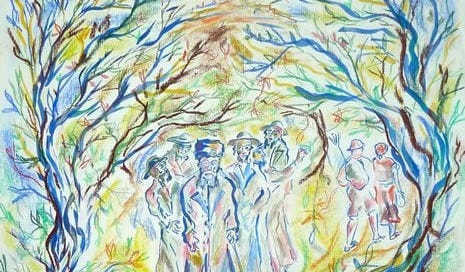I remember walking around a lake with my brother Jay one summer when he was in Rabbinical school and I was starting my study of herbs. Though we didn’t fully understand each other then, we had a moment of connection as we shared what each of us loved about our chosen paths. What we said was surprisingly similar— I love herbalism because, in a way, it is everything. You can go in so many different directions, like botany, chemistry, spirit, lore. And there is such an abundance of plants to get to know that it would take lifetimes to build relationships with them all. Jay had a related take on the depth, breadth, and intensity of the Jewish tradition. There’s something exciting about apprenticing yourself to a discipline you can’t ever hope to fully master. And there’s something freeing about this realization, too.
Every new herb student goes through a phase of ‘herb lust’, where we try to consume as much knowledge and plant material as possible. We make too much medicine. We move too fast. It’s all very exciting. And then, we often settle into a different rhythm, a slower dance that better suits and respects the plants.
I’ve fallen in love with a Hebrew word over the last several years that’s helped me think about and articulate these rhythms of slower learning and relating: Kavanah (כַּוָּנָה). Like all Hebrew words, this one has many layers of meaning. The most common translation is ‘intention’. When we do something with kavanah, we do it with full intention.
As with plants, the roots of words carry potency. The root of kavanah is kaf-vav-nun (כ-ו-ן), which means ‘to straighten’, ‘to direct’, or ‘to aim’. When we find this verbal root in old texts and commentaries, the object is often the human heart. And so we can understand kavanah as the aim of our heart. I see this bi-directionally, both as how we direct our heart with deep intention, as well as how focused we are in listening to our heart’s own direction.
This heart-intention of kavanah is deeply important to Jewish prayer. The 11th century philosopher-Rabbi Bahya Ibn Pakudah stated: “Prayer without kavanah is like a body without a soul.” Maimonides agrees: “Any prayer recited without kavanah is not a prayer at all”.
In the end, kavanah is a spiritual practice.
What does it look like to apply this practice to herbalism? Maybe it looks like slow courtship, full of dedication and reverence— drinking reishi every morning for months to tune in to the feeling of the mushroom in your nervous system as you go about your day; playing harmonica to a grandfather yellow dock four times a week for an entire year; making the ascent to a special pilgrimage spot high in the mountains, to visit and pray with the plants there, a handful of times every year for a decade.
What happens when we return to a particular stand of plants over and over again? What happens when we stop throwing heaps of knowledge at our herbalist-imposter-syndrome and simply get to know one small place or plant as deeply as possible, with as much kavanah as we can muster? In my experience, a surprising thing happens: that one plant or place or practice becomes enough. Our hunger to know all the knowledge evaporates because we’ve just been fed in the wild way we’ve been craving.
The speed of kavanah is the fastest I can go while still maintaining intention. That speed is different day to day and when I find that I’ve lost my kavanah, the easiest way to recover it is to slow down to the point I can pick it back up again. Herbalism at the speed of kavanah keeps me in right relationship to plants. Friendships take nurturing, time, consistency, and love. Our courtship with plants and place can be no different.
These lessons I’ve been learning through herbalism have profoundly influenced the way I relate to my Jewishness as well. Anyone who has taken a break from Jewish practice, or didn’t grow up with a lot of Jewish knowledge, can relate to feeling overwhelmed by it all. Thousands of years of spiritual dialogue is a lot to catch-up on. But I’ve been thinking about going at the speed of kavanah when I feel the pull of one song to apprentice to, or one prayer to weave around my heart, or a ritual practice to etch onto my bones. And done with kavanah, that is enough.
As we enter spring, it’s easy to feel the rush of energy and get lost in all of our hectic summer plans. But I offer a challenge for us— find one place or one plant to court this summer. One sit spot to return to over and over again. One intention for deepening our herbal practice. And let that be enough. Dayenu.




Such gorgeous medicine, Ben. Deeply resonant in my plant relationship practice and beyond. I literally just sorted and cleared out to too-much-medicine in my apothecary borne of going too fast. I noticed with gratitude that much was bottled a couple of years ago--helping me notice again how I've begun to slow into relationship. Kavanot became part of my broader spiritual practice as I learned of this frame in earth-loving Jewish spaces; it's a blessing to read your weaving of this rich word-frame-shape with your herbalism and feel how it sits cozily in my body. Thank you, and yasher koach <3
Beautiful! Thank you!